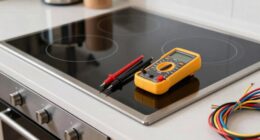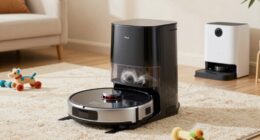We are all aware that appliances use electricity, but have you ever thought about which ones use the most? Luckily, we have the data to answer your question.
Air conditioners, water heaters, electric ovens, clothes dryers, refrigerators, washing machines, microwaves, televisions, and desktop computers are the biggest energy hogs in our homes.
In this article, we’ll break down the numbers and analyze just how much power these appliances are using.
So, get ready to master your energy consumption knowledge!

Key Takeaways
- Air conditioners are one of the highest electricity-consuming appliances.
- Water heaters and electric ovens also consume a significant amount of electricity.
- Clothes dryers contribute to high electricity consumption.
- Energy-efficient alternatives such as tankless water heaters, smaller cooking appliances, air-drying clothes, and heat pump or gas dryers can help reduce energy consumption.
Air Conditioners
Air conditioners are one of the highest electricity-consuming appliances. When it comes to energy consumption, these devices rank high on the list. The cooling efficiency of an air conditioner is a key factor in determining its energy usage. The higher the cooling efficiency, the less energy it requires to cool a given space. This is measured by the Seasonal Energy Efficiency Ratio (SEER) rating.
The SEER rating indicates the cooling output of an air conditioner divided by the energy it consumes. A higher SEER rating means better energy efficiency. Therefore, when purchasing an air conditioner, it’s important to consider its SEER rating to ensure optimal cooling performance while minimizing energy consumption.
Now let’s move on to the next topic: water heaters.
Water Heaters
When it comes to appliances that consume a significant amount of electricity, water heaters are a top contender. Energy-efficient water heaters, such as tankless or heat pump models, can help reduce energy consumption and save on utility bills. It’s also worth exploring cost-saving alternatives, like solar water heaters, which harness the power of the sun to heat water.

Are you experiencing any common water heater issues, such as leaks or insufficient hot water? Let’s discuss these points in more detail.
Energy-Efficient Water Heaters
How can we maximize energy efficiency with water heaters?
There are several energy-efficient water heater options available that can help reduce energy consumption and lower utility bills. One popular option is tankless water heaters, which offer the following advantages:
- Energy savings: Tankless water heaters only heat water when it’s needed, eliminating standby energy loss.
- Space-saving design: These units are compact and can be mounted on walls, saving valuable floor space.
- Longevity: Tankless water heaters have a longer lifespan compared to traditional storage tank models.
- Endless hot water: With a tankless water heater, you never run out of hot water, as it heats water on-demand.
Cost-Saving Alternatives
Our preferred cost-saving alternative for water heaters is upgrading to a tankless model. Tankless water heaters are energy efficient and provide hot water on demand, eliminating the need for a large storage tank and reducing standby heat loss. According to the U.S. Department of Energy, switching to a tankless water heater can save households up to 50% on their water heating costs. In addition to the energy saving benefits, tankless water heaters are also eco-friendly options as they produce fewer greenhouse gas emissions compared to traditional storage tank water heaters. By investing in a tankless water heater, homeowners can not only reduce their energy consumption but also contribute to a greener environment. Now, let’s move on to discuss common water heater issues.
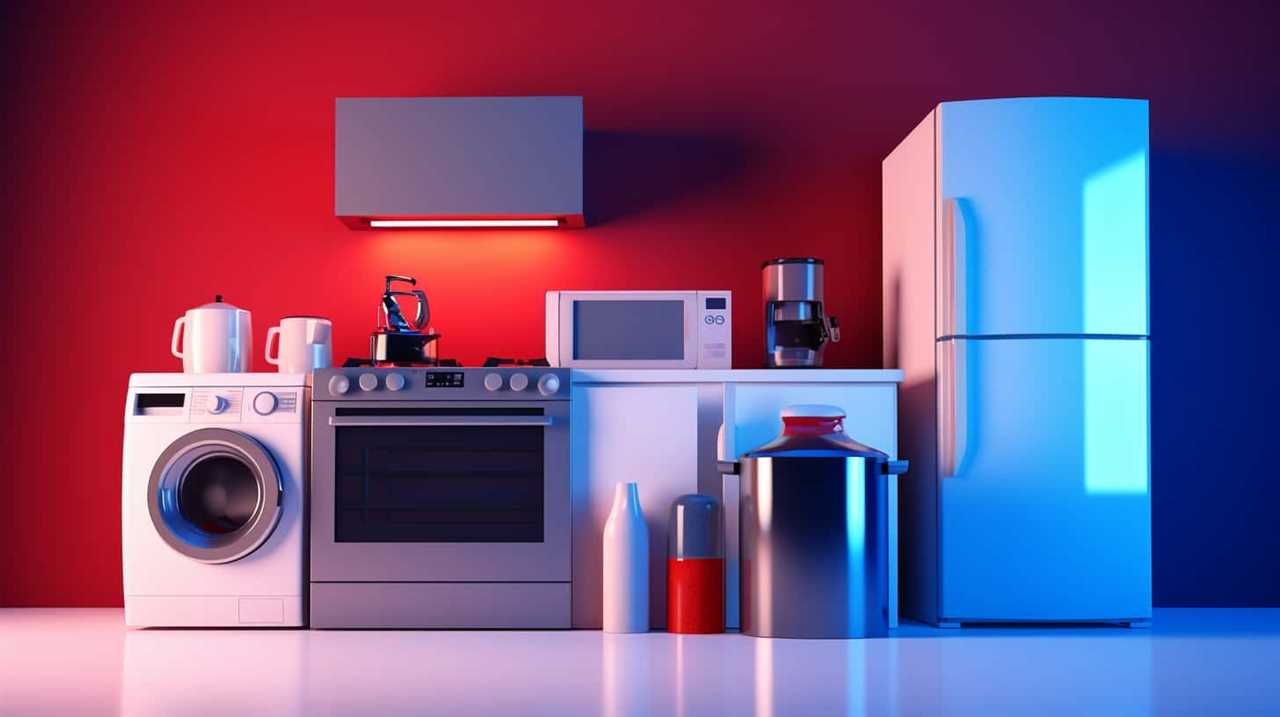
| Pros | Cons |
|---|---|
| Energy efficient | Higher upfront cost |
| Provides hot water on demand | May require additional installation |
| Eco-friendly option | Limited hot water output |
| Space-saving design | May require a larger gas line |
Transition: Now that we’ve explored cost-saving alternatives for water heaters, let’s delve into the common issues that homeowners may encounter with their water heaters.
Common Water Heater Issues?
Now let’s address some common issues that homeowners may encounter with their water heaters. Here are some troubleshooting tips and common water heater maintenance practices that can help resolve these problems:
- No hot water: Check if the pilot light is lit. If not, relight it following the manufacturer’s instructions. Also, ensure that the thermostat is set to the desired temperature.
- Leaking tank: Inspect the tank for any visible leaks. If found, it may be necessary to replace the tank or contact a professional plumber.
- Strange noises: Sediment buildup in the tank can cause noises. Flushing the tank can help remove the sediment and restore normal operation.
- Low water pressure: Check if the pressure relief valve is functioning correctly. If not, it may need to be replaced.
Electric Oven
One of the appliances that consumes the most electricity in our home is the electric oven. When it comes to energy consumption, electric ovens rank high due to their heating elements and long cooking times.
However, there are energy efficient cooking options that can help reduce the usage of the oven. For example, using smaller appliances like toaster ovens or slow cookers for certain dishes can significantly decrease energy consumption.

Additionally, utilizing alternative cooking methods such as grilling or using a microwave can also help minimize oven usage. By incorporating these energy saving techniques into our cooking routine, we can reduce our overall electricity consumption and save on our energy bills.
Now, let’s move on to discuss another energy-consuming household appliance: clothes dryers.
Clothes Dryers
When it comes to clothes dryers, there are a few key points to consider.
Firstly, exploring energy-efficient alternatives can significantly reduce electricity consumption.

Secondly, reducing dryer usage by air-drying clothes or using lower heat settings can also save energy.
Lastly, implementing cost-saving tips such as cleaning the lint filter regularly and ensuring proper venting can further optimize dryer efficiency.
Energy-Efficient Alternatives
We frequently opt for energy-efficient alternatives like clothes dryers to reduce electricity consumption. When it comes to energy-efficient clothes dryers, there are a few key options to consider:
- Heat pump dryers: These use a heat pump to recycle hot air and are much more efficient than conventional dryers.
- Gas dryers: If your home has a natural gas connection, a gas dryer can be a cost-effective and energy-efficient choice.
- Ventless dryers: These dryers don’t require an external vent, making them a great option for apartments or homes without proper ventilation.
- Solar-powered dryers: By harnessing renewable energy sources like solar power, these dryers can significantly reduce your carbon footprint.
Choosing energy-efficient alternatives not only helps save electricity but also contributes to a greener and more sustainable future. By incorporating energy-efficient lighting and renewable energy sources into our daily lives, we can make a significant impact on reducing our overall energy consumption.
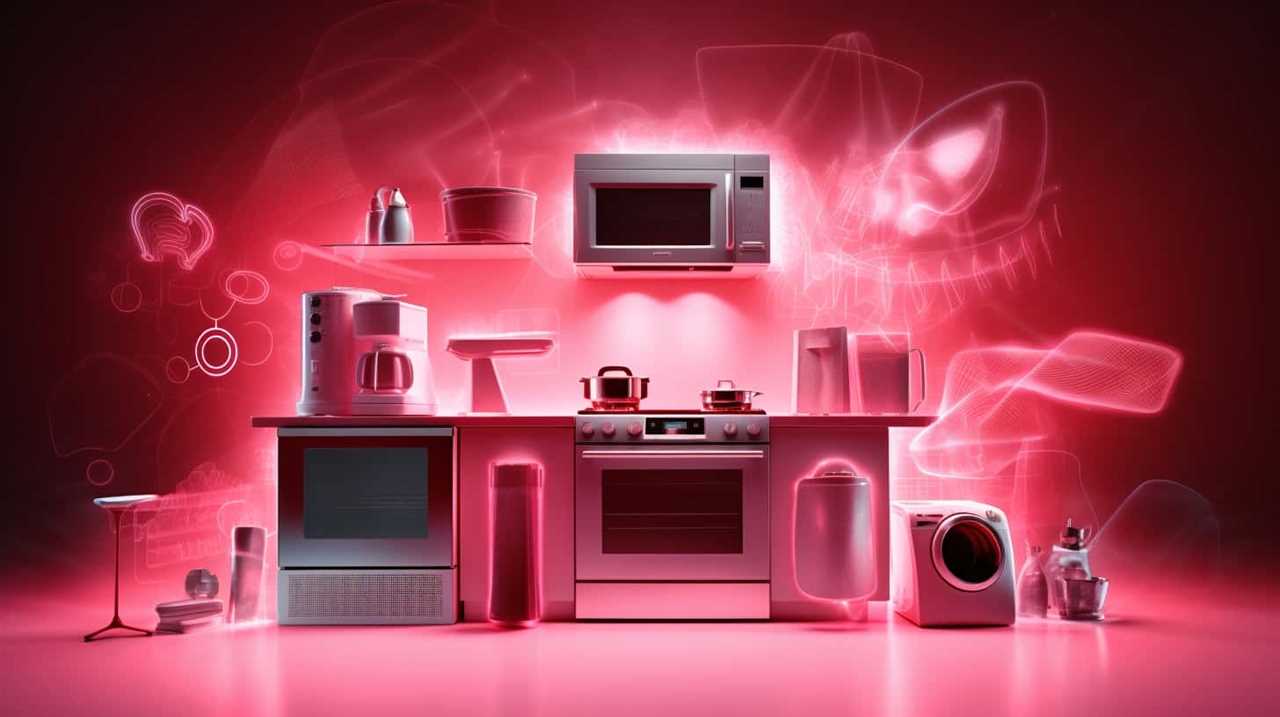
Reducing Dryer Usage
To reduce electricity consumption, one effective measure is to minimize the usage of clothes dryers. Clothes dryers are known to be one of the biggest energy consumers in households.
However, there are several eco-friendly drying methods that can help reduce energy consumption while still ensuring your clothes are dry and fresh. One option is line drying, where clothes are hung outside to dry naturally. Another option is to use a drying rack indoors.
These methods not only save energy but also help preserve the quality of your clothes. By reducing the usage of clothes dryers and adopting these eco-friendly drying methods, you can contribute to a more sustainable and energy-efficient lifestyle.
Now, let’s move on to the next section, where we’ll explore some cost-saving tips.

Cost-Saving Tips
One effective way to save on electricity costs when it comes to clothes dryers is through efficiency. By following these cost-saving tips, you can reduce your energy consumption and lower your utility bills:
- Invest in an energy-efficient clothes dryer: Look for models with the ENERGY STAR label, which indicates that they meet strict energy efficiency guidelines.
- Opt for air-drying: Whenever possible, hang your clothes to dry instead of using the dryer. This not only saves electricity but also extends the lifespan of your garments.
- Clean the lint filter regularly: A clogged lint filter restricts airflow, making the dryer less efficient. Clean it after each use to improve drying performance.
- Dry full loads: Running the dryer with partial loads wastes energy. Wait until you have a full load before starting a drying cycle.
Refrigerators
Refrigerators are significant consumers of electricity. They’re constantly running, ensuring that our food stays fresh and safe to consume. However, this continuous operation also means that refrigerators have a high energy consumption. On average, a refrigerator can account for 14% of a household’s total energy usage.
To minimize energy consumption, there are some maintenance tips to keep in mind. Firstly, make sure to keep the refrigerator coils clean and free from dust buildup. This allows the appliance to run more efficiently. Additionally, regularly check the door seals to ensure they’re properly sealed and not letting cold air escape. Lastly, avoid placing hot or warm food directly into the refrigerator as it can increase its workload and energy usage.
Now that we understand the energy consumption and maintenance tips for refrigerators, let’s move on to the next appliance on our list: electric stoves.

Electric Stoves
Electric stoves account for a significant portion of our household’s electricity consumption. When it comes to energy efficient cooking methods, there are several benefits of using induction stoves. Here are some key points to consider:
- Induction stoves use electromagnetic fields to directly heat the cookware, resulting in faster cooking times and less energy waste.
- These stoves are highly responsive, allowing for precise temperature control, which can lead to more efficient cooking.
- Induction stoves are also safer to use, as they don’t generate an open flame or heat up the surrounding surface.
- With their sleek design and easy-to-clean surfaces, induction stoves aren’t only efficient but also visually appealing in any kitchen.
Transitioning to the next topic, dishwashers also play a significant role in our household energy consumption.
Dishwashers
When it comes to saving electricity, one appliance that consumes a significant amount of energy in our household is the dishwasher.
Dishwashers are convenient and time-saving, but they can also be energy-intensive if not used efficiently.
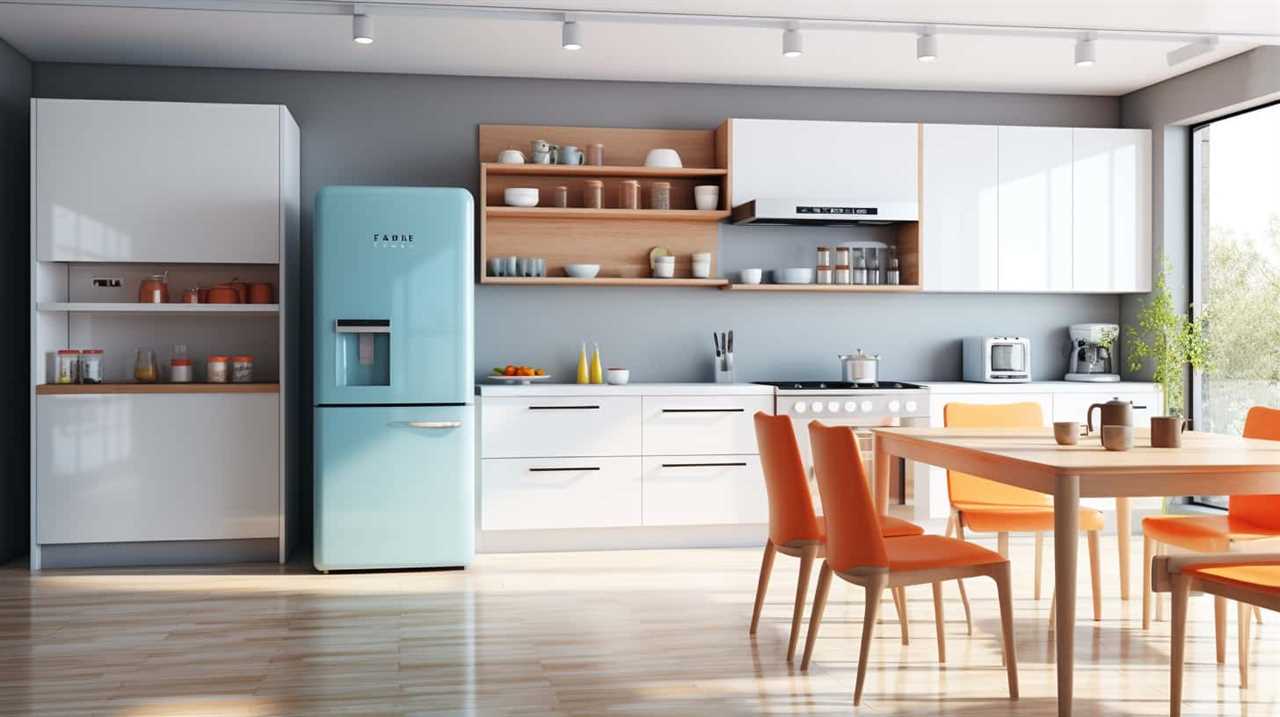
To minimize dishwasher energy consumption, regular maintenance is essential.
Cleaning the filter regularly and ensuring that the spray arms are free from debris can improve efficiency and reduce energy usage.
It’s also important to load the dishwasher properly, avoiding overcrowding and allowing for proper water circulation.
Using the dishwasher’s energy-saving settings, such as the eco or light wash cycles, can also help reduce energy consumption.

Additionally, running the dishwasher with a full load rather than multiple smaller loads can further maximize energy efficiency.
Washing Machines
When it comes to washing machines, there are a few key points to consider.
First, energy-efficient washing machines can help reduce electricity consumption. By choosing a model with a high energy star rating, we can save both energy and money in the long run.
Secondly, adopting cost-saving laundry habits such as using cold water, avoiding overloading the machine, and air-drying clothes can further minimize electricity usage.

Lastly, it’s important to analyze the impact of washing machines on our electricity bills to determine if any adjustments or changes need to be made to optimize efficiency and cost-effectiveness.
Energy-Efficient Washing Machines
We have found that energy-efficient washing machines can significantly reduce electricity consumption. These machines are designed to optimize energy usage and minimize wastage.
Here are some key features and benefits of energy-efficient washing machines:
- Advanced technology: Energy-efficient washing machines utilize innovative technologies, such as sensors and smart controls, to optimize the washing process and reduce energy consumption.
- Water-saving techniques: These machines are designed to use less water by incorporating features like load sensing and water level adjustment, resulting in significant water savings.
- Energy efficient laundry detergents: Using energy-efficient washing machines in conjunction with energy-efficient laundry detergents can further reduce electricity consumption.
- Cost savings: Energy-efficient washing machines can help save on electricity bills in the long run, making them a cost-effective choice for households.
Cost-Saving Laundry Habits
To maximize cost savings with washing machines, implementing efficient laundry habits is crucial.
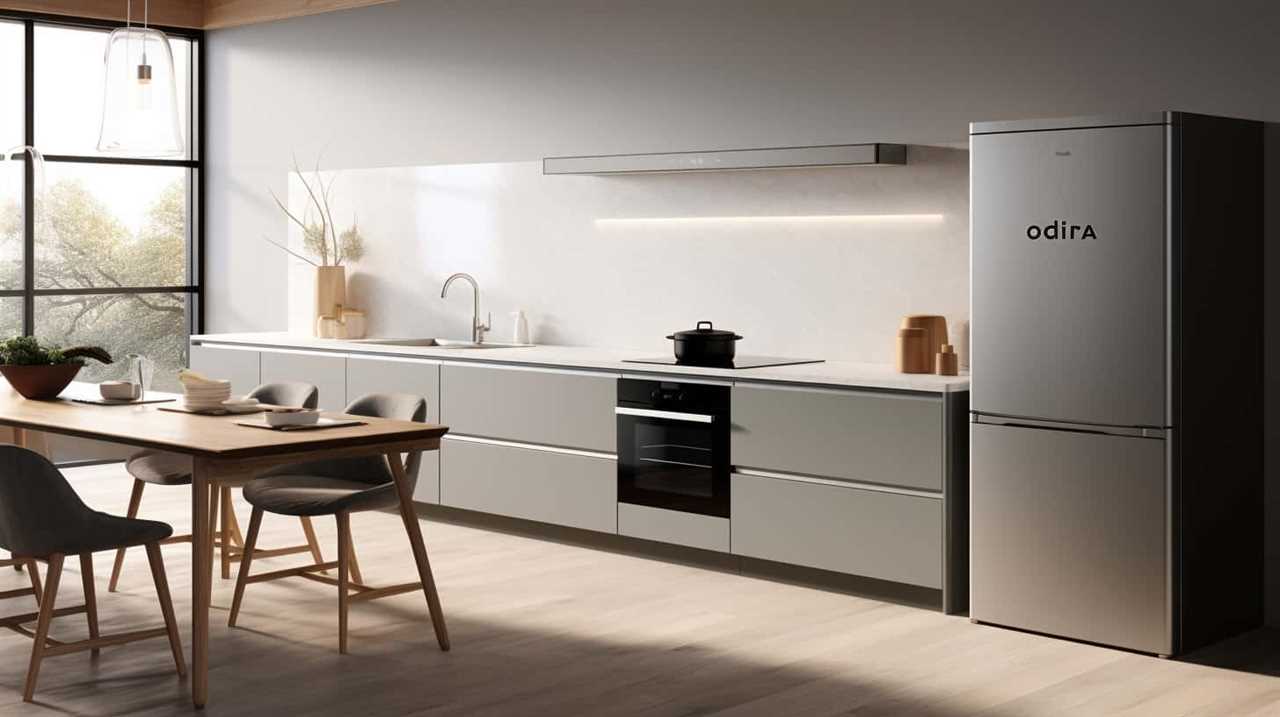
One of the most effective ways to reduce costs is by reducing water consumption. Washing machines can use a significant amount of water, particularly during the rinse cycle. By selecting the appropriate water level for each load and avoiding unnecessary extra rinses, you can conserve water and save on your utility bills.
Additionally, using eco-friendly laundry detergents can further contribute to cost savings. These detergents are designed to be more concentrated, requiring less product per load. They also contain fewer harsh chemicals, which isn’t only better for the environment but can also extend the lifespan of your washing machine.
Impact on Electricity Bills?
How much electricity do washing machines consume and what impact does it have on our bills?
Washing machines can be a significant contributor to our energy consumption and subsequently, our electricity bills. Here are some key points to consider:
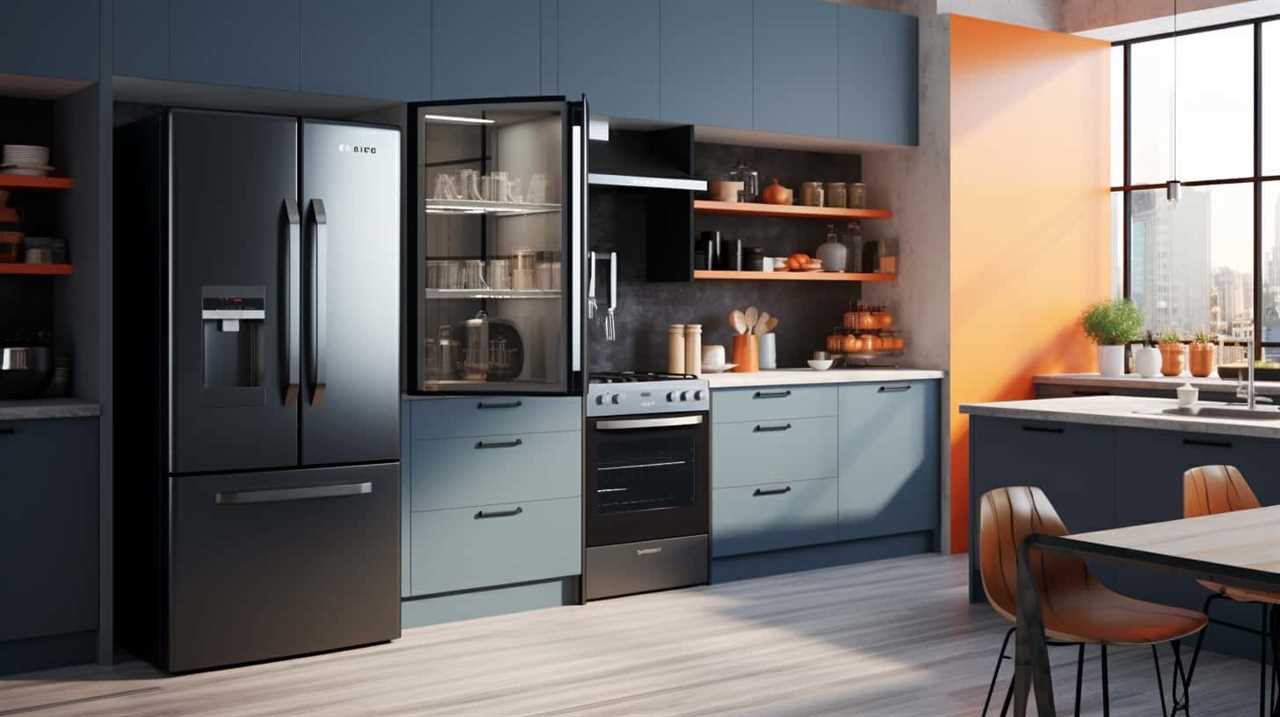
- Washing machines consume varying amounts of electricity depending on factors such as load size, water temperature, and cycle duration.
- On average, a washing machine uses around 400 to 1300 watts per hour of operation.
- The impact on energy consumption and bills can be substantial if washing machines are used frequently, especially if they’re older models that are less energy-efficient.
- Strategies for reducing electricity bills include using cold water whenever possible, opting for shorter wash cycles, and ensuring full loads.
Microwaves
Microwaves consume a significant amount of electricity when used regularly. It’s important to consider microwave safety and implement energy-saving practices to minimize their impact on your electricity bills.
To ensure microwave safety, always follow the manufacturer’s instructions, use microwave-safe containers, and avoid overheating food. Additionally, regularly clean the microwave to prevent any build-up that can affect its efficiency.
When it comes to energy efficiency, consider these microwave cooking tips: use the appropriate power level for the task, cover food to retain moisture and reduce cooking time, and utilize the microwave’s preset cooking functions whenever possible. By implementing these practices, you can reduce the electricity consumption of your microwave and save on your energy bills.
Now, let’s move on to discussing another electricity-consuming appliance: televisions.

Televisions
Moving on to the next electricity-consuming appliance, televisions are another significant contributor to high energy consumption. When it comes to televisions, there are a few important factors to consider in terms of energy efficiency.
- Energy efficient televisions: Opt for models that are labeled as energy efficient. These televisions are designed to consume less electricity while still providing high-quality viewing experiences.
- Smart televisions: These TVs are equipped with advanced features that allow for internet connectivity and streaming services. While they offer convenience and entertainment, it’s important to note that smart TVs typically consume more energy compared to regular televisions.
- Screen size: Larger televisions tend to consume more electricity. Therefore, choosing a smaller screen size can help reduce energy consumption.
- Usage habits: How you use your television also affects energy consumption. Turning off the TV when not in use, adjusting brightness settings, and enabling power-saving modes can all contribute to energy savings.
Desktop Computers
When it comes to energy consumption, desktop computers are among the appliances that consume the most electricity.
In order to reduce energy usage and increase efficiency, it’s important to perform regular desktop computer maintenance and consider upgrading desktop hardware. By keeping the computer clean and free of dust, it can run cooler and require less power.
Furthermore, upgrading components such as the processor, graphics card, and power supply can improve performance while simultaneously reducing energy consumption.

Additionally, optimizing power settings and using energy-saving features can also help to minimize electricity usage.
It’s crucial for users to stay informed about the latest advancements in desktop technology and implement energy-saving practices to ensure that their computers operate efficiently while minimizing their environmental impact.
Frequently Asked Questions
How Can I Reduce the Energy Consumption of My Air Conditioner?
To reduce energy consumption of your air conditioner, we recommend using energy-saving tips such as keeping blinds closed during the day, using a programmable thermostat, and maintaining regular maintenance checks for optimal efficiency.
What Factors Affect the Electricity Consumption of a Water Heater?
Factors affecting water heater electricity consumption include tank size, insulation, temperature setting, and usage patterns. To make water heaters more energy efficient, consider installing a timer, insulating the tank and pipes, and reducing hot water usage.

Are There Any Alternative Cooking Methods That Use Less Electricity Than an Electric Oven?
Are there cooking methods that use less electricity than an electric oven? Yes, there are alternative cooking methods like induction cooktops and microwave ovens, which are more energy efficient and can help reduce electricity consumption.
How Can I Make My Clothes Dryer More Energy-Efficient?
Upgrading ventilation and using lower heat settings can make your clothes dryer more energy-efficient. These measures reduce the amount of electricity consumed, allowing you to save money and reduce your environmental impact.
What Are Some Tips for Reducing the Energy Usage of a Refrigerator?
To reduce energy usage of a refrigerator, we recommend organizing it efficiently by grouping similar items together and keeping the door closed as much as possible. When purchasing, choose an energy-efficient model with a high Energy Star rating.
Conclusion
In our quest to uncover the truth behind electricity consumption, we’ve unveiled the mighty culprits that devour power like insatiable beasts.

Air conditioners and water heaters are the voracious giants, while electric ovens and clothes dryers follow closely behind. Refrigerators, washing machines, microwaves, televisions, and desktop computers complete this electrifying ensemble.
These appliances, like fierce warriors, battle for dominance over our energy bills.
Now armed with this knowledge, we can make informed choices to tame the energy-hungry beasts within our homes.






